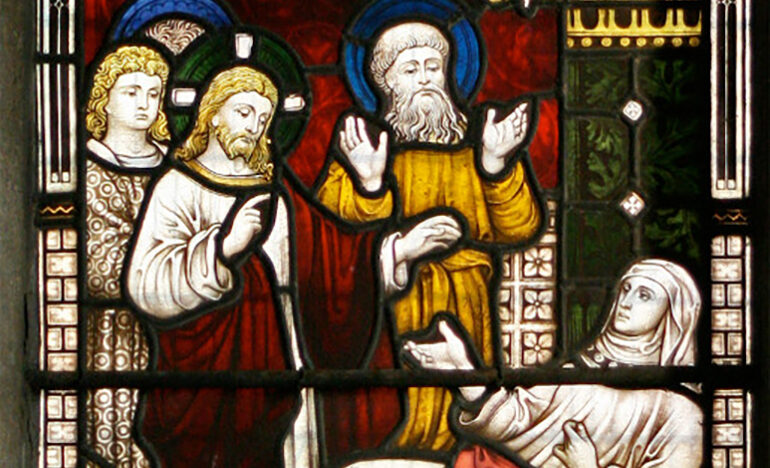Out of Contemplation Grows Action

By Kathy Keary
“Come to me, all you who labor and are burdened, and I will give you rest.”
—Matthew 11:28
The stress in our world today can be overwhelming. We find no solace by turning on the news to learn the latest developments of the pandemic that is wreaking havoc not only across the world but in our own backyard. Hearing of the tragedies that have struck many families is heart-wrenching. Deep concern for our own safety and that of our loved ones is an understandable dilemma.
We can turn to Scripture to find a sense of comfort and reassurance that God is with us in these troubled times.
Emmanuel invites us to rest in his loving embrace finding peace in the stillness “like a weaned child to its mother” (Psalm 131:2b). The divine continues to call us with words that have the power to quiet our spirit, “Be still and know that I am God” (Psalm 46:11).
Our full series in the Contemplative Prayer Video Series is here.
Revisit earlier articles in our Contemplative Life Series here.
Throughout Scripture we find that Jesus went off by himself to commune with the Sacred One. I can only imagine his need to be strengthened by availing himself to the divine embrace in the stillness of his soul. He lovingly instructs us, “When you pray, go to your inner room, close the door, and pray to your Father in secret” (Mt 6:6). The inner room is the recesses of our heart where we will find the indwelling spirit of the Holy One – the one who hungers for communion with us. Jesus urges us to silence by asserting: “In praying, do not babble like the pagans, who think that they will be heard because of their many words” (Mt 6:7). We are summoned to simply rest.
Now brace yourself. The next Scripture passage has ruffled many feathers:
As they continued their journey he entered a village where a woman whose name was Martha welcomed him. She had a sister named Mary [who] sat beside the Lord at his feet listening to him speak. Martha, burdened with much serving, came to him and said, “Lord, do you not care that my sister has left me by myself to do the serving? Tell her to help me.” The Lord said to her in reply, “Martha, Martha, you are anxious and worried about many things. There is need of only one thing. Mary has chosen the better part and it will not be taken from her” (Luke 10:38-42).
Years ago after hearing the proclamation of this Gospel, a parishioner standing in front of me turned around obviously perturbed and whispered, “I think Martha got a raw deal.” Throughout Scripture, we hear the importance of service. In Micah 6:8, the Lord summons us to “do justice.” Jesus stirs us into action by the words found in Matthew 25:40, “Amen, I say to you, whatever you did for one of these least brothers of mine, you did for me.” And we can’t forget: “So also faith of itself, if it does not have works, is dead” (James 2:17).
‘I think Martha got a raw deal.’
So what is Jesus saying to us in this passage involving Mary and Martha? He is certainly emphasizing the importance of being present in the moment. Mary is attentive to the words of Jesus. All worries and distractions are cast aside. Her focus is directed only on the one who is reaching out to her. She embodies the art of contemplation. She is one with Jesus. It is this contemplative stance exhibited by Mary that propels us to reach out to those in need — to extend a helping hand to our sisters and brothers in Christ. Through contemplation, our outreach is centered in the divine sanctifying our actions.
As our relationship with God evolves through contemplative prayer, our circle of concern for others widens. We realize that not only are we the beloved of God, but everyone is a child of God deserving of our love. As we draw into deeper communion with the divine, our sense of unity with others is fortified propelling us to action.
In the words of James Finley: “Love for God and love for others are not two loves, but rather two manifestations of one love. These two manifestations are bound so closely to each other that one is impossible without the other.”
‘Love for God and love for others are not two loves, but rather two manifestations of one love.’
Finley’s mentor, Thomas Merton, expresses it this way: “A person cannot enter into the deepest center of himself (herself) and pass through that center into God unless he (she) is able to pass entirely out of himself (herself) and empty himself (herself) and give himself (herself) to other people in the purity of selfless love.”
Our world today is in great need of both prayer and action. May our kinship with our Creator strengthen us for the road ahead and draw us into communion with one another. May all we do be rooted in our union with God experienced in the stillness of our soul. May we seek the Lord’s comfort during these trying times.
Note: New articles in this series will be posted to the website every Monday and Wednesday. Full series can be found here: An Invitation to Something New: The Contemplative Life. On Thursday’s we’ll send an email to remind you of the articles.
[Kathy Keary, a Precious Blood Companion and spiritual director, holds a master’s degree in theological studies and is a graduate of the Atchison Benedictine’s Sophia Center’s Souljourners Program, an intense study of spirituality and spiritual direction. Kathy believes that the divine is present and active in all of life and encourages others to be awakened to the God in all including the divine within. She enjoys accompanying others on their journey to wholeness discovering the person they were created to be.]
Image above is “Christ in the House of Martha and Mary,” 1628, by Jan Bruegel and Peter Paul Rubens. National Gallery of Ireland
This article was first published on March 30, 2020.
Related

Making a Banner for Lent Part 2
A Coffee with Padre Video
Fr. Timothy finishes his Lenten banner and continues his reflections on how colors and materials become potent symbols that bring the Lenten season alive. The final banner serves as a visual reminder of our spiritual journeys.

Lent Video Four — Guided Meditation: ‘Traveling in the Dust of the Rabbi’
In this video, Fr. Ron reads the Gospel, Mark 1:29-34, for you and then leads you through a guided meditation, taking you deeper into that story. He calls this experience “an example of traveling in the dust of the rabbi.”
Categories
Assembling God's Puzzle Coffee with Padre Cooking & Spirituality Encounters of the 4th Kind Family Matters Reflections on the Eucharsitic Prayers Spiritual Resources Taize Prayers The Contemplative Life Traveling with Pilgrims of Hope Uncategorized Videos Week of Prayer for Uhristian Unity When you need a little help
